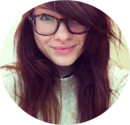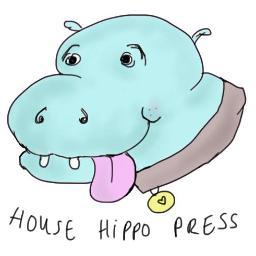We spoke to Sofie and Erica of House Hippo Press, a feminist LGBTQ press based in Toronto that publishes zines, about the inspiration for their zine, missed connections, and the importance of women (self-identified) only spaces.
We spoke to Sofie and Erica of House Hippo Press, a feminist LGBTQ press based in Toronto that publishes zines, about the inspiration for their zine, missed connections, and the importance of women (self-identified) only spaces. Established in May 2013, HHP is a two-person project with a tiny budget and a love for independent press.


ROOM: How did House Hippo Press get started?
SOFIE: House Hippo Press was started after Erica and I made one issue of I Like Girls. Then we saw an ad for Zine Dream, last summer. And I was like, oh my God, we should totally go– but we couldn’t go with just one zine. Thus, House Hippo was born, and we quickly got a few more zines together to make it a thing.
ERICA: I was never really into zines (to be honest, never even heard of them) before I met Sofie. I first made my own perzine, Boys & Girls & Dykes & Me, as a way to deal with bullying and homophobia I dealt with in my teenhood. Then, Sofie suggested I Like Girls, and the press came into being. The rest is history.
ROOM: Your zine name is really interesting. Is there any connection to the Concerned Children’s Advertisers PSA about the house hippo? I sure hope there is.
SOFIE: For sure! That was the inspiration!
ERICA: We know cute animals sell. We always get asked about our name, and it’s been a great way to get people to stop by our tables at zine fairs. We’re a total marketing machine (just kidding).
ROOM: Both House Hippo Press zine issues, Missed Connections and Honest Dating Profiles draw their inspiration from the online dating world. What do you find so interesting about online dating as a theme for your issues?
SOFIE: I personally just find the Missed Connections section on Craigslist to be the saddest, most beautiful and surreal place online. Like, people post stuff with the slimmest chance of trying to find who they hope is their soulmate. People are pouring their hearts out online. To me, that stuff is just accidental poetry, the way it’s worded sometimes.
ERICA: Honest Dating Profiles was actually all about our friend Hana’s first foray into online dating. She found everyone’s Plenty of Fish and OkCupid profiles to be just plain bullshit, and thought it would be funny to compile profiles of what people are actually like. We’re happy to say Hana no longer needs to sift through those profiles, though she does have aspirations to make another issue of the zine.
ROOM: As a feminist LGBTQ press can you touch upon the importance of carving out women (self-identified) only spaces?
SOFIE: Women NEED their own spaces, and LGBTQ+ women need their own space even more so. We basically live in a world where every space is a safe space for white cis men, which is cool and all, I guess, but part of the reason I got so aggressive about starting this zine press is because LGBTQ people barely get any representation in media, and in the end, I guess we all just have to make our own media. If nobody cares about getting LGBTQ people’s work and art and words out there, then we have to do our best to get it out there ourselves. Our “I Like Girls” zine series showcases the work of various artists and writers from across the world, and maybe without our little publication, they wouldn’t have had a platform to get their work published, or to get their work out there. Women definitely need a space, but unfortunately some feminism doesn’t expand as much as LGBTQ safe spaces for people, which is something that we’re trying to address and maybe even change with our work. You know, having just a safe space for women is awesome, but as LGBTQ people, we’re kind of just told, well that’s good enough. But it’s not. And if nobody is going to help create that space for us, we will make it ourselves.
ROOM: What’s the greatest joy in creating a zine? And the greatest challenge?
SOFIE: The greatest joy is definitely seeing the finished product, and how nicely everything comes together. Personally for me, the greatest challenge is seeing how everything will be laid out and doing all the pages and stuff. I have to fold a bunch of little papers together and make a mock zine.
ERICA: The greatest joy for me is probably getting the chance to feature the talent of writers and artists who maybe don’t have access to mainstream platforms to express themselves, or the content of their work hasn’t been deemed appropriate for the mainstream. To me, writing (and art in general) is so cathartic and I just feel like getting the opportunity to express yourself creates such a release. It’s sheer bliss for me. The greatest challenge? Printing costs and managing creative differences (as in any field as an editor).
ROOM: Do you have any advice for anyone wanting to start their own zine?
SOFIE: Honestly, just go for it. Make sure you have an idea and some follow-through, though. Take your idea and expand it– or narrow it down. Make it yours. Then, put it together. Do you want a personal zine or one with contributors? Work the idea out until you’re happy with it, and then start working on the actual thing. Look at some other zines for inspiration on sizes and design and stuff. That’s the hardest part!
ERICA: Don’t be afraid to just delve into it. A zine can be just about anything you want it to be. The great thing about them is that there are no formulas, and you really don’t need any technical, writing or art experience to make one yourself. Oh, and be honest with yourself. The whole point of zines is to go against the grain and create something honest and thoughtful. Be true to yourself, and it’ll make your content all the better. (Then, hit us up so we can buy and read it!)
ROOM: To add to our #readwomen2014 reading list – name your five favourite female authors!
Sofie: I actually had to think about it– turns out I don’t read many female authors. Bummer.
-Judy Bloom
-Margaret Atwood
-JK Rowling
-Zoe Trope
-Kate Beaton
I am disappointed with how boring my list is. I definitely need to get on that.
Erica: I’m embarrassed at how few women I actually read in terms of literary work. So, in addition to women who have written novels, I would like to suggest some female journalists and essayists:
-Sarah Liss
-Robyn Doolittle (seriously, how great was Crazy Town?)
-Scaachi Koul
-Julie Maroh
-Sylvia Plath














